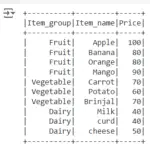Row wise sum of the dataframe in R or sum of each row is calculated using rowSums() function. Other method to get the row sum in R is by using apply() function. row wise sum of the dataframe is also calculated using dplyr package. rowwise() function of dplyr package along with the sum function is used to calculate row wise sum. we will be looking at the following examples
- Row wise sum in R dataframe using rowSums()
- Row sum of the dataframe using apply() function.
- Row wise sum of the dataframe using dplyr package.

First let’s create the dataframe
### Create dataframe
df1 = data.frame( Name = c('George','Andrea', 'Micheal','Maggie','Ravi','Xien','Jalpa'),
Mathematics1_score=c(62,47,55,74,32,77,86),
Mathematics2_score=c(45,78,44,89,66,49,72),
Science_score=c(56,52,45,88,33,90,47))
df1
df1 will be

Row wise sum in R dataframe using rowSums()
Let’s calculate the row wise sum using rowSums() function as shown below. rowSums() function takes up column 2 to 4 and performs row wise sum
## row wise sum using rowSums() df1$row_sum = rowSums(df1[,c(2,3,4)]) df1
or
## row wise sum using rowSums() df1$row_sum = rowSums(df1[,c(-1)]) df1
so the resultant dataframe will be

Row wise sum in R dataframe using apply() function
Let’s calculate the row wise sum using apply() function as shown below. apply() function takes three arguments first argument is dataframe without first column and second argument is used to perform row wise operation (argument 1- row wise ; 2 – column wise ). third argument sum function sums up the values. so here it performs row wise sum
### Row wise sum using apply() function df1$row_sum = apply(df1[,-1], 1, sum) df1
So the resultant dataframe with row wise sum calculated will be

Row wise sum of the dataframe using dplyr: Method 1
rowSums() function takes up the columns 2 to 4 and performs the row wise operation with NA values replaced to zero. row wise sum is performed using pipe (%>%) operator of the dplyr package.
##### Dplyr row wise sum library(dplyr) df1 %>% replace(is.na(.), 0) %>% mutate(row_wise_sum = rowSums(.[2:4]))
So the resultant dataframe with row wise sum calculated will be

Row wise sum of the dataframe using dplyr: Method 2
Row wise sum is calculated with the help rowwise() function of dplyr package and sum() function as shown below
## row wise sum using dplyr
library(dplyr)
df1 %>%
rowwise() %>%
mutate(
Total_price = sum(c(Mathematics1_score,Mathematics2_score,Science_score))
)
row wise sum of “Mathematics1_score” , “Mathematics2_score” and “Science_score” is calculated and populated for each row as shown below

For more Details kindly refer to matrixStats package in R
Other Related Topics





